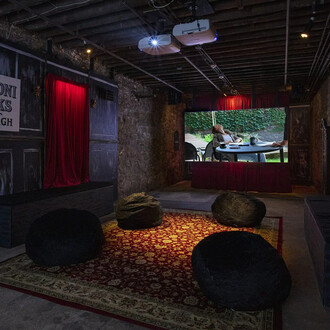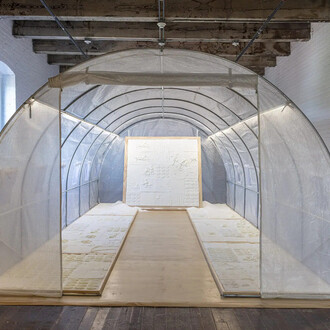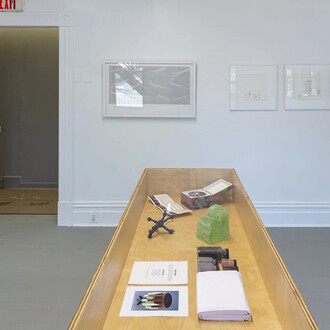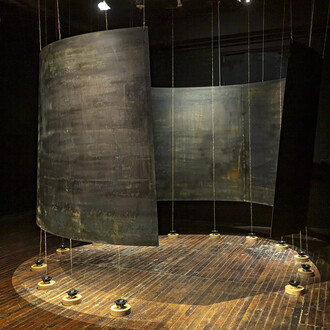I would advise the audience to walk, explore, move up and down and also look at other people moving because you will see that the way other people view space might be different from the way you view space. It’s about looking. I want the audience to really spend time looking.
(Eugene Macki)
Reification (noun): The process of regarding or treating an abstraction as if it had concrete or material existence.
In their largest and most ambitious project to date, Eugene Macki transforms abstract concepts of meaning and value into a visceral and bodily experience. By incorporating performance, sculpture, and installation, Macki's work challenges and encourages viewers to question how we assign significance to objects and spaces.
In a gallery with walls covered in thick, viscous rubber, visitors encounter a sloped wooden walkway that bisects the space, extending its entire length. Surrounding this structure are over two hundred rubber-coated sculptures, buried amidst a landscape of thousands of meticulously cut cardboard fragments. Evoking the Terracotta Army of China, a vast assembly of clay statues representing the armies of China's first Emperor, as well as archaeological sites in Greece, Reification references these ancient monuments while becoming an activated site for discovery.
Although Macki's practice is deeply conceptual and often poses questions about the nature of existence, Reification remains grounded in the physical and blurs the role between observer and space. The walkway serves as a passageway, elevating the viewer and transforming them into active participants. At the gallery’s far end, the artist further explores the body through three video screens, each featuring a series of durational performances by Macki and collaborator Michelle Boulé. The videos show the two artists navigating the empty gallery, exploring how their movements can activate the space. The two bodies merge, entangle, and withdraw, all the while conscious of the tension created when bodies encounter and respond to each other.
Reification is also a reflection of Macki's interest in the ubiquity and perceived value of objects. By manipulating humble materials like roofing rubber and cardboard—typically associated with practical needs—Macki repurposes them in ways that defy their original use and, in doing so, strips away conventional ideas of worth. Here, the artist draws our attention to the significance we assign to objects and spaces, challenging us to rethink what we deem important and meaningful, further questioning and transforming our ideas on meaning and value.
Eugene Macki is a multi-disciplinary artist who grew up in Hackney, East London. Macki's artwork is known for its versatility and encompasses a range of mediums including sculpture, installation, land art, experimental video, and performance. Their artistic contributions have been recognized with awards such as the Space Artist Award and Space Hackney Studio Award in 2021, and the Gilbert Bayes Award by The Royal Society of Sculptors in 2020. Macki's explores what it means to exist and the role of objects within this field of existence. They are also interested in different types of transformations, and how objects come to acquire meaning.
Macki was selected for exhibition by a panel of Mattress Factory alumni artists through International Open Call. Mattress Factory believes that alumni artists, those artists who have completed a residency and exhibition with us, know better than anyone what our resources and capacity can accomplish and how special our community is. The panel offers a perspective unlike any other, one that is deeply familiar with the museum, engaged in many aspects of the contemporary art field, and invested in pushing our exhibitions program in new directions. The artist alumni panelists were Vanessa German, Sohrab Kashani, Christopher Meerdo and Sarah Oppenheimer.
















